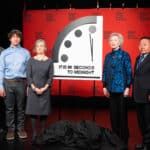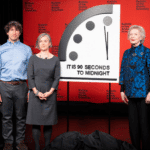Hit delete on the “right” to nuclear energy in new weapons ban
By Ray Acheson | June 30, 2017

This week, the UN conference negotiating a nuclear weapons ban released a new draft of the proposed text. The overwhelming majority of participants who reacted spoke favorably of this version, saying it was headed in the right direction and a good basis for further work.
This is welcome news, suggesting that negotiators will reach agreement by July 7 as hoped. However, the introduction of a new paragraph on nuclear energy in the preamble is extremely problematic. This addition affirms the “inalienable right” of states party to develop and use nuclear energy for “peaceful purposes.”
The so-called right to nuclear energy is already enshrined in the existing Nuclear Non-Proliferation Treaty (NPT), and reflects an outdated understanding of the technology’s risks. It is part of an ill-conceived bargain designed to convince countries that don’t already have nuclear weapons not to develop them.
We know that nuclear energy increases proliferation opportunities. All nine nuclear-armed states have used nuclear reactors to create plutonium for their nuclear weapons. In the United Kingdom and France, civilian nuclear energy and military programs overlapped. North Korea and India acquired nuclear weapons through supposedly “peaceful” civilian nuclear programs. Fears about Iran’s nuclear energy program drove a major diplomatic effort to limit its ability to develop nuclear weapons.
We also know that nuclear energy poses grave economic, environmental, humanitarian, safety, and security risks. These are evident in the persistent health impacts of uranium mining and nuclear waste, and in disasters like those that occurred at Chernobyl and Fukushima. The new ban treaty is borne from the urgent need to prevent the catastrophic humanitarian and environmental consequences that would result from a nuclear detonation. It must not, then, reflect a “right” to a technology that can also have devastating radioactive impacts.
The ban treaty may not be able to curb nuclear energy, but it must not give any legitimacy to this failed and destructive technology. Enshrining permission to develop nuclear energy, removed from the context in which this “right” was granted under the NPT, could actually risk establishing a broader right than already exists.
Without the NPT’s conditional framework of IAEA safeguards, which only allows states to develop nuclear energy if they are in compliance with non-proliferation obligations, adding a reference to the “right” to nuclear energy to the new ban treaty suggests that all states have this right, regardless of whether they conform to safeguards or non-proliferation commitments.
To avoid creating this kind of loophole, the focus of the new ban treaty must remain on prohibiting nuclear weapons. Nothing in the other provisions of the new draft precludes peaceful development of nuclear energy. They only prohibit nuclear weapons and nuclear explosive devices. Transplanting language on nuclear energy from the NPT to the new ban treaty only creates legal ambiguities, while being offensive to the victims of nuclear energy accidents. This provision must be deleted.
This post is part of Ban Brief, a series of updates on the historic 2017 negotiations to create a treaty banning nuclear weapons. Ban Brief is written by Tim Wright, Asia-Pacific director of the International Campaign to Abolish Nuclear Weapons, and Ray Acheson, director of Reaching Critical Will.
Together, we make the world safer.
The Bulletin elevates expert voices above the noise. But as an independent nonprofit organization, our operations depend on the support of readers like you. Help us continue to deliver quality journalism that holds leaders accountable. Your support of our work at any level is important. In return, we promise our coverage will be understandable, influential, vigilant, solution-oriented, and fair-minded. Together we can make a difference.
Topics: Announcement













